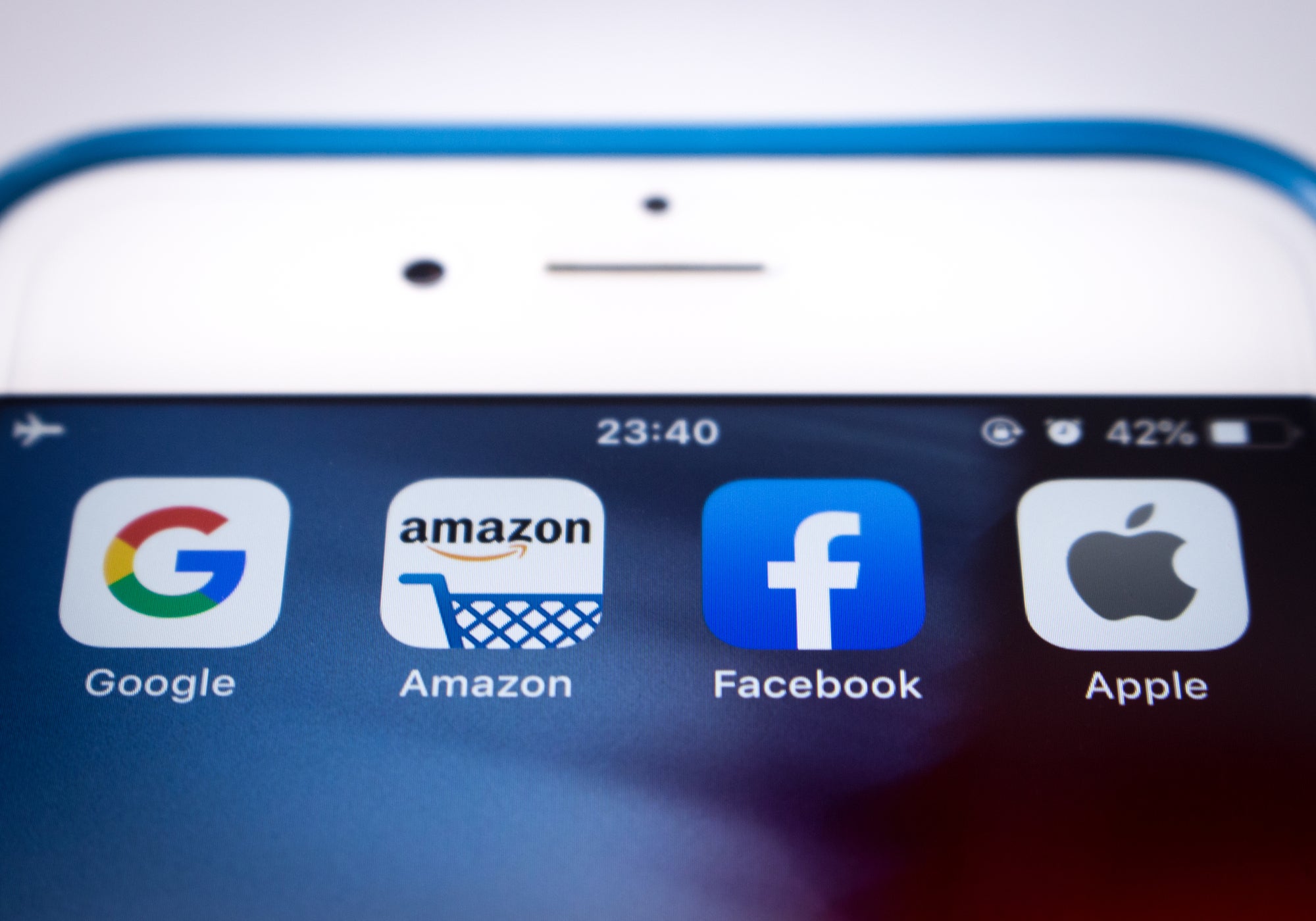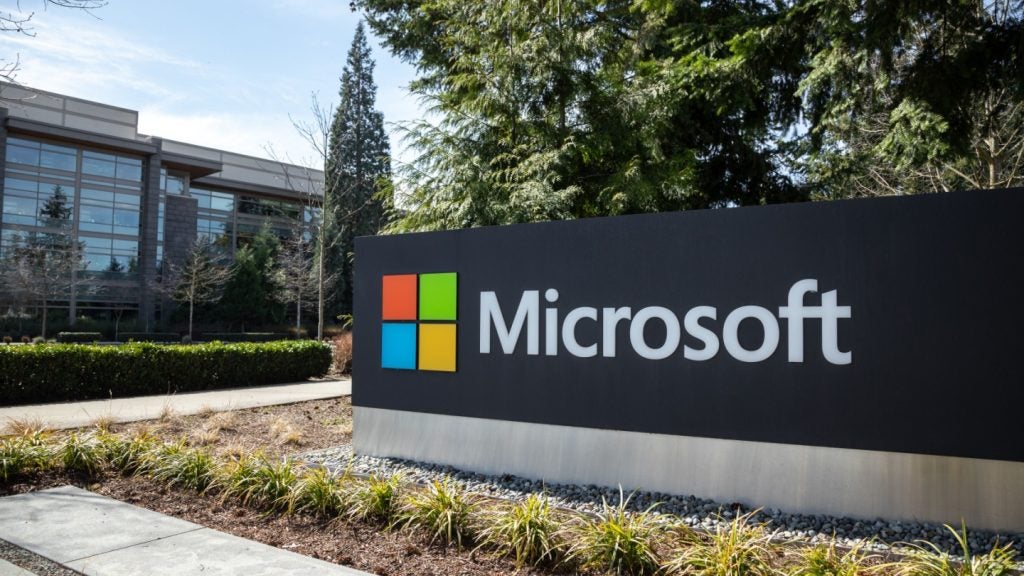
The world’s biggest technology companies – Apple, Amazon, Facebook and Google – have reported largely blowout quarterly results, demonstrating their resilience to the disruption caused by the coronavirus pandemic.
Combined, the four companies reported a quarterly net profit of $38 billion at a time when many traditional industries have seen revenues slump, redundancies made and businesses closed down.
Against this backdrop, Big Tech profits this year looks set to widen the wealth gap between them and non-technology companies.
Here’s how the Big Tech firms fared in their latest quarterly earnings:
Amazon
Amazon saw its profits triple this quarter as the pandemic’s stay-at-home measures continued to shift consumer buying habits to online. It reported net income of $6.3bn, up from $2.1bn in the year-ago period. This translated to diluted earnings per share of $12.37.
The US company said it had incurred more than $7.5bn in incremental Covid-related costs so far this year, but these have been absorbed by record revenues. This quarter, Amazon reported revenue of $96.15bn, up 36% year on year.
How well do you really know your competitors?
Access the most comprehensive Company Profiles on the market, powered by GlobalData. Save hours of research. Gain competitive edge.

Thank you!
Your download email will arrive shortly
Not ready to buy yet? Download a free sample
We are confident about the unique quality of our Company Profiles. However, we want you to make the most beneficial decision for your business, so we offer a free sample that you can download by submitting the below form
By GlobalDataAmazon Web Services (AWS), the company’s cloud computing business, reported net sales of $11.6bn for the quarter, up 29% year on year.
Amazon’s success is expected to continue next quarter, which will include the sales from Amazon Prime Day and holiday shopping.
“Amazon delivered another homerun quarter, underlining the fact that its business model perfectly positions it to expand its e-commerce dominance even more broadly as the Covid-19 pandemic continues to spread,” said Jesse Cohen, senior analyst at uk.Investing.com.
“Amazon’s key business looks primed for more blockbuster growth for its key fourth quarter, which covers the holiday shopping season.”
Google parent Alphabet beat Wall Street expectations to report revenue of $46.17bn in its third-quarter results. The search and advertising giant shrugged off its first-ever revenue decline in the previous quarter, when its core advertising business took a hit from customers slashing ad spend to weather the economic fallout of the pandemic.
This quarter, Google’s advertising unit brought in sales of $37.1bn, up from $33.8bn a year ago.
Google Cloud, which includes AWS rival Goole Cloud Platform, saw strong revenue growth, up 45% year on year to $3.4bn. Advertising revenue from YouTube outstripped analyst expectations, netting sales of $5bn compared with forecasts of $4.4bn.
Overall, Alphabet’s profits came in at $11.2bn for the quarter, up from $7bn this time last year.
“After its first-ever revenue decline in Q2, Alphabet crushed expectations. There is clear evidence that the company’s core digital ad market is rebounding strongly after the pandemic-induced slump,” said Haris Anwar, analyst at uk.Investing.com.
“The biggest surprise comes from YouTube, where ad sales have been much stronger than expected. These numbers are generating a very strong buying interest right now in Google shares after some sluggish months.
“These earnings suggest that the worst might be over for the social media giant.”
Apple
The world’s most valuable company reported revenue of $64.7bn in its fiscal fourth-quarter earnings, a mild beat on Wall Street expectations. Profit was down from $13.7bn a year ago to $12.7bn. A 20% year-on-year decline in iPhone sales was the biggest factor in this slump.
However, those figures do not include sales of the iPhone 12, which launched after the Q4 cut off.
Despite this, work from home measures helped drive record Mac sales, which stood at $9bn for the quarter ended 28 September.
Apple’s growing services segment saw revenue increase to $14.5bn, up from $12.5bn a year ago.
“iPhone aside, this was a strong quarter for Apple with other product categories continuing to perform robustly,” said Geoff Blaber, Americas VP research at CCS Insight.
“We are inclined to view iPhone weakness in the quarter as validation of strong demand for iPhone 12 in fiscal Q1.
“The fact that total company revenue grew year-on-year despite a big fall in iPhone revenue underlines the increased diversification of Apple’s product lines. iPhone remains the anchor product but 2020 has shown that Apple’s broader business is resilient and can weather shifts in demand to its core product.”
Like Google, Facebook’s core advertising business took a hit earlier this year due to the pandemic. However, the social media giant saw advertising revenue increase by 22% year on year this quarter to $21.2bn.
Overall, revenue grew to a record $21.47bn from $17.65bn a year ago.
Facebook also weathered an advertising boycott, in which hundreds of companies cancelled advertising spend due to concerns over Facebook’s handling of hate speech on the platform.
Its net income was $7.85bn, compared with $6.1bn this time last year.
Globally, Facebook’s monthly active users – a key metric for appealing to advertisers – grew by 12% to 2.74 billion. However, there were slowdowns in the US and Canada.
“Similar to other social media platforms, Facebook showed no signs that it was feeling the squeeze from the coronavirus pandemic,” said uk.Investing.com’s Cohen.
“Despite an ongoing boycott, small and medium-sized businesses, which make a much bigger contribution to the company’s overall sales, continued to allocate their ad dollars to Facebook.
However, the company faces a big test over the coming weeks during the US presidential election.
“Facebook has put many measures in place over the last two years to combat social network problems with elections,” said Martin Garner, COO at CCS Insight.
“But the biggest test of all will be next week as the US Presidential election takes place. The company will face enormous scrutiny for all the election activity it handles and there is bound to be a large and public postmortem, whoever wins.”
For now, there is one clear winner in 2020 – Big Tech and it’s ever-growing profits.
Read more: Big Tech CEOs grilled by Congress: Key moments from the historic antitrust meeting







